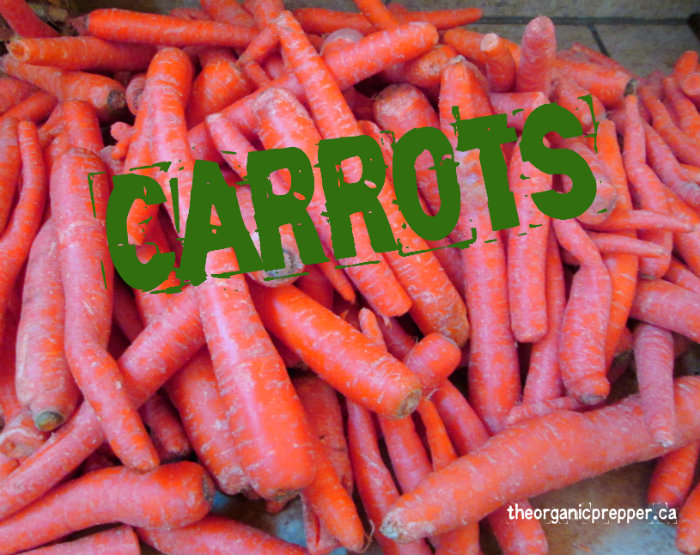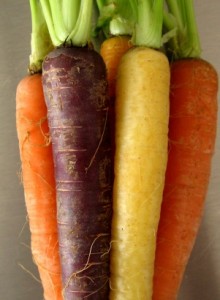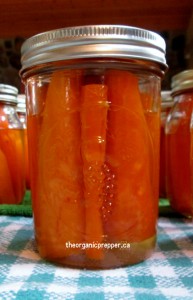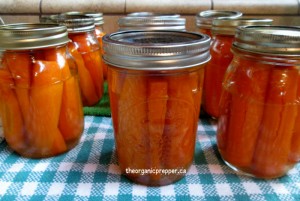If you're new here, you may want to subscribe to my RSS feed. Thanks for visiting!
The leaves are beginning to turn, the air is crisp, and the current harvest is root vegetables. This week the focus is on carrots, crisp and sweet, straight from the rich earth. I just scored a 25 pound box of fresh carrots and spent part of a day preserving them – if you don’t have them growing in your own back yard, you can find a local farm or market HERE and get a great deal at this time of year!
Carrot trivia: In ancient times, carrots were actually used for their seeds and foliage as opposed to their taproots. The modern carrot that we enjoy originated over one thousand years ago in Afghanistan. Carrots were mentioned medicinally in ancient Greek and Latin writings. They are typically orange, but there are also heirloom varieties that are purple, red, white, and yellow. Carrots were first documented to be cultivated in North America in 1607. China and Russia produce 2/3 of the world’s carrot supply. Americans only consume an average of 1 cup of carrots per week.
Nutritional benefits
Carrots are bursting with nutrients.
- A one cup serving of carrots contains about 52 calories, no fat, 12 grams of carbohydrates, and 4 grams of fiber.
- A serving of carrots contains 4 times the minimum RDA of Vitamin A.
- Carrots also contain substantial amounts of B6, thiamine, vitamin C, vitamin K, and vitamin E.
- Carrots contain the minerals sulphur, phosphorus, copper, folic acid, and magnesium.
- Carrots have healing, diuretic, and sedative properties.
- The brighter orange a carrot is, the greater the amount of valuable beta-carotene it contains. Beta carotene is a vital antioxidant phytonutrient.
- Carrots are beneficial to eye health and can help to prevent glaucoma and cataracts.
- Carrots aid in the prevention of colon cancer.
Using fresh carrots
If carrots are organic, peeling is entirely optional – just scrub them well with a brush. If you choose to peel your carrots, store them in a dish of water in the fridge. Carrots should be stored away from ethylene-producing items like potatoes, apples, and pears, as they will cause faster spoilage.
Carrots are excellent raw, cooked, shredded, in a salad, roasted, or pureed into a soup.
A favorite side dish in our household is carrot “fries” which I often serve in place of french fries.
Carrot Fries
Ingredients
- 4 cups of carrots, sliced into coins or sticks
- 3 tbsp of olive oil
- 1 tsp of garlic powder
- 1 tsp of onion powder
- 1 tsp of seasoning salt (no msg)
- 1/2 tsp of cayenne pepper (optional)
Directions
- Preheat the oven to 425 degrees Fahrenheit.
- In a large bowl, mix seasonings into olive oil.
- Stir in carrot slices and toss until they are well coated.
- Spread the carrots on a cookie sheet in a single layer.
- Bake for 20 minutes, then flip the carrots to get them evenly browned.
- Return to the oven for another 10-15 minutes until the carrots are crisp and lightly golden.
- Serve with yogurt ranch dip or barbecue sauce.
Preserving carrots
Freezing: Freezing results in the next best thing to fresh carrots. Peel them if you opt to do so, then blanch the carrots in boiling water for 2-5 minutes, depending on the size you have cut the carrots into. Immediately dunk them into an ice bath for 5 minutes, then freeze them on a cookie sheet. Once they are completely frozen, store them in well-sealed Ziplock bags. Frozen carrots can be roasted, steamed, or boiled.
Dehydrating: To dehydrate carrots, shred them with a coarse grater. Spread them in a thin layer on the tray of your dehydrator and process overnight. Store in an airtight jar in a cool, dark place. Dehydrated carrots can be added to baked goods, soups, stews, and casseroles.
Canning: Canning is not my favorite method of preserving carrots because of the “mushy” texture that results from the pressure canning process. Leaving them in bigger chunks (or even whole) will result in a firmer canned carrot.
Honeyed Carrots
Ingredients
- 10 pounds of carrots
- Raw honey
- Lemon juice
- Sea salt
Directions
- Clean and cut the carrots into your desired size.
- Stuff the sanitized jars full of carrots, making sure you leave a half an inch of headspace at the top of the jar. Add 1/2 tsp of honey, 1 tsp of lemon juice, and a dash of salt (if desired) to each pint jar.
- Fill the jars with hot water, allowing 1/2 inch of headspace.
- Lid the jars and then process them in a pressure canner at 10 pounds for 20 minutes, adjusting for altitude.



















6 Responses
Two more ways to enjoy those carrots for longer – either use young carrots or make chunky sticks, and pickle in a brine/vinegar solution, or ferment (like sauerkraut) in a light brine solution and then store in jars. I’ve put these out with other pickled veg for side dishes, and also, you can soak then for an hour in clean water and use them in some recipes, things like bigos and various other european stews.
Also, the note about the greens and seeds being used therapeutically is totally true, and the greens are delicious in salads, cooked in various dishes, and also used as a pickling herb. And they add HEAPS to the mineral and vitamin content, just like herbs.
(For instance, my pickling vinegar usually has wild onion greens, carrot greens, celery greens, and radish greens floating around with the vegetables. And my meals all incorporate as many parts of the vegetable as I can manage to fit into the flavour profile.)
Score!!! And now you have some awesome goodness! Thanks for sharing.
Perhaps you could share your source for this information and give credit where it is due.
Lots more carrot information in the World Carrot Museum.
Hi John – I checked out your site! It’s wonderful! I will post the link below.
During the research for my article I also found some trivia on Wikipedia, World’s Healthiest Foods, Health Diaries, Nutrition Data, Livestrong, and Food Reference. I try to find the information in more than one place to confirm that it is true.
Folks, to learn everything there is to know about carrots, check out the World Carrot Museum.
http://www.carrotmuseum.co.uk/
Thanks for reading!
Best wishes ~
Daisy
I have vaccum packed them for years. they always come out tasting just like fresh. in order to process alot of carrots. i use a madolin. its quick and fast, just watch your fingers.
We packed our carrots in sand in the root cellar. Ate the last two carrots shredded in salad just as the new carrots were ready in late July. Having trouble getting temp down this year so don’t know if they will last as long. Hoping!